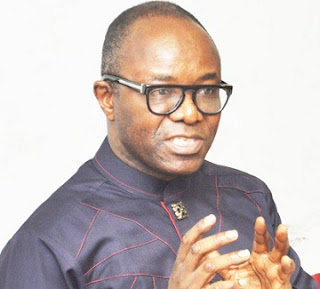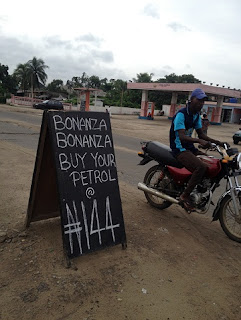Showing posts with label Dr Ibe Kachikwu. Show all posts
Showing posts with label Dr Ibe Kachikwu. Show all posts
At Last, FG Allots Huge Oil Blocks To Niger Delta Indigenes
News Proof 11.4.17 No comments Edit Post
The Guardian Newspaper - To douse tension in the oil-rich Niger Delta, the Federal Government plans to award to indigenes of the region marginal fields’ oil blocks abandoned by the oil majors as being not commercially viable.
The plan is in line with the government’s larger objective of reducing major incidents of restiveness to about 90 per cent by next year. Over the years, there have been agitations over oil resource ownership, which have become intense with allegations that about 90 per cent of northerners own the oil blocks awarded in the country.
If the plan is implemented, the ownership structure of the nation’s petroleum assets will not only begin to change, but also empower the host region, which has for decades suffered economic deprivation and environmental degradation on account of these resources.
The Minister of State, Petroleum Resources, Ibe Kachikwu, who disclosed this yesterday in Lagos, said the plan was part of the larger “stability incentive scheme” under “a harmonised holistic development plan for the Niger Delta.”
Expatiating on the plan, Kachikwu said: “This will include creating stability incentive schemes – jobs, investments, contracting opportunities for the zone, and the use of marginal fields’ allocations to state governments and indigenes to help reduce tension and get buy-in without excluding the rest of the country.”
The minister disclosed this at the Oil and Gas Trade Group Roundtable organised by the Nigerian-British Chamber of Commerce (NBCC), to discuss “The Nigerian Oil and Gas Industry: Confronting Realities.”
Represented by the Acting Permanent Secretary, Ministry of Petroleum, John Eboigbe, the minister also promised that government would sustain institutional engagements with stakeholders in the Niger Delta region to nip agitations in the bud, while promising greater transparency in the industry’s operations.
Despite the promises, industry players are concerned over the sustainability of government’s effort, stressing that the future of the sector is uncertain unless inherent challenges are tackled.
Calling for the immediate passage of the Petroleum Industry Bill (PIB), to fix the challenges, the experts insisted that the sector was still confronted by inadequate private sector engagement and management, poor policy implementation, legacy issues, transparency, trust and security, political will, inadequate infrastructure among other germane issues.
These challenges, many believe, are responsible for the dearth of fresh investments in the sector, and its poor contribution to the nation’s gross domestic product (GDP).
They said projected growth in the sector, particularly as regards efforts to boost the country’s crude oil production from 2.2 million barrels per day (mbpd) to 2.5 mbpd by 2020 might be threatened.
Speaking on refining capacity, the Executive Secretary, Major Oil Marketers Association of Nigeria (MOMAN), Obafemi Olawore, insisted that efforts to repair existing oil refineries in the country would end up as a waste of time and national resources.
For such efforts to be successful, Olawore said the refineries must be privatised to give a lead share of 51 per cent to private owners, 15 per cent to the Federal Government, 10 per cent to state and local government respectively and 14 per cent to local community.
The Chairman, Petroleum Technology Association of Nigeria (PETAN), Bank-Anthony Okoroafor, who said the sector must be concerned about job creation, urged government to channel local fund to allow Small and Medium Enterprises (SMEs) to participate in the sector. The NBCC President, Adedapo Adelegan, argued that the petroleum sector must be structured to achieve multiplier impact across sectors.
He said: “With the fall in oil prices, and inflation rate hitting above 17 per cent, and the depreciation of the naira, there is a serious need for businesses to think outside the box and devise sustainable survival strategies.”
The Chairman, Oil & Gas Sector Group, NBCC, Aisha Abdurrahman, stressed the need to patronise local contractors in project execution, adding that policy somersault, harsh operating environment, and government’s continuous delay of the PIB were not helpful to the sector.
Abdurrahman said: “There is a need to ensure a stable and predictable framework for the oil and gas industry, which in turn creates the necessary predictability that is of crucial importance for our competitiveness. When producers plan their future activities, they look at projections of future demand and future supply, and make their decisions based on market signals. However, when future policy is unclear, market signals will also be blurred. If the policy is unpredictable and/or unstable, markets signals will be unclear.”
Notwithstanding stakeholders’ fears, Kachikwu, assured that the oil and gas sector, remained critical to the nation’s economy. But he admitted that inadequate investment, lack of local capacity, limited cash call, poor economic structure, pipeline vandalism and other factors continued to hinder the sector’s contribution, particularly in the area of job creation.
Going forward, the minister promised that the oil and gas industry was adopting a sustainable and well-structured stakeholder management framework that would address its peculiar needs and circumstances.
SHOCKER: Cook To Indicted NNPC MD Absconds With $6m Raw Cash Kept Secretly In House
News Proof 2.11.16 No comments Edit Post
Sahara Reporters - A cook who served Esther Nnamdi-Ogbue, a Managing Director at the Nigeria National Petroleum Corporation (NNPC) in Abuja, has absconded with cash and pieces of jewelry worth $6million, a source told SaharaReporters on Wednesday.
It was gathered that the man, identified as Gabel Segbedji, a national of Benin Republic, took off with the loot in a Toyota Camry car which also belonged to her boss, last Wednesday.
Although reportedly devastated by the development, Mrs. Nnamdi-Ogbue did not report the burglary to the police, in the hope of avoiding further attention, as she is already under investigation by the Economic and Financial Crimes Commission (EFCC).
Mrs. Nnamdi Ogbue was the Managing Director of the cash-spinning Petroleum Products and Marketing Company (PPMC) before she was moved to Products Retail by then GMD of NNPC, Ibe Kachikwu, in 2015.
Segbedji is said to have been recommended for employment to Mrs. Nnamdi-Ogbue by a close friend of hers, Toke Benson. Our source said the NNPC chief obtained the mountain of cash from kickbacks given by oil marketers
The theft of the stash is likely to affect plans for the wedding of her daughter scheduled for later this month in London.
BREAKING: Buhari SACKS Ibe Kachikwu As NNP GMD, Appoints Replacement
News Proof 4.7.16 No comments Edit Post
President Muhammadu Buhari has sacked Emmanuel Ibe Kachikwu as the group Managing Director of the Nigerian National Petroleum Corporation and replaced him with Maikanti Baru.
In a press statement issued today in Abuja, the president office stated that Kachikwu as the minister for State for Petroleum will now be the chairman of the Board of the NNPC.
See full statement below:
President Muhammadu Buhari has approved the composition of the Board of the Nigerian National Petroleum Corporation (NNPC), as provided for under Section 1(2) of the Nigerian National Petroleum Corporation Act of 1997, as amended.
The new board is composed of the following:
A. Chairman-Dr Emmanuel Ibe Kachikwu, Honourable Minister of State for Petroleum;
B. Group Managing Director- Dr Maikanti Kacalla Baru;
C. The Permanent Secretary of the Federal Ministry of Finance; and
D. The following six persons:
1. Mallam Abba Kyari
2. Dr Thomas M.A John
3. Dr Pius O. Akinyelure
4. Dr Tajuddeen Umar
5. Mallam Mohammed Lawal, and
6. Mallam Yusuf Lawal.
President Buhari urges the new board to ensure the successful delivery of the mandate of the NNPC, " and serve the nation by upholding the public trust placed on them in managing this critical national asset."
FEMI ADESINA
Special Adviser
(Media and Publicity)
July 4, 2016
Pipeline Bombing: At Last; FG, N'Delta Avengers Reach Truce
News Proof 21.6.16 No comments Edit Post
The President Muhammadu Buhari-led Federal Government have succeeded in reaching a truce with the Niger Delta Avengers and other militants groups wrecking havoc in the nation's oil facilities, thereby crippling the economy, News Punch has reliably learnt
The government has agreed to a 30-day ceasefire truce with the militants to give President Muhammadu Buhari time to come up with a comprehensive plan for the oil-rich region, ThisDay Newspaper reports this morning.
According to our source, the “30 days of quiet” was said to have been agreed upon last week by a federal government team led by the Minister of State for Petroleum Resources, Dr. Ibe Kachikwu, and representatives of the militant groups, community leaders and the state governments.
Last week, Kachikwu had led a government delegation to different camps in Bayelsa and Delta States, including visiting the temporary site of the Maritime University at Okerenkoko, Gbaramatu Kingdom in Warri South Local Government Area of Delta State, in a bid to reach out to representatives of the militant groups to get them to stop its attacks on oil and gas facilities.
The activities of the militants have halved Nigeria’s oil production to some 1.4 million barrels per day, impacted negatively on power supply in the country and the country’s oil earnings.
According to a source who opened up on the 30-day period of truce, Kachikwu was said to have reached out to the militants through back channels and pleaded for some time for the Buhari administration to come up with a comprehensive Niger Delta plan that would address most of their demands.
The militant groups, the source said, accepted Kachikwu’s plea, adding that since the agreement was reached there had been no attacks on oil and gas installations in the oil-rich region.
“You would have noticed that there have been no bombings of oil assets in recent days. This is the fall out of the 30 days of quiet reached with the minister and his team.
“This will give the president time to come up with a comprehensive plan for the Niger Delta,” the source said
He also revealed that some of the demands made by the militants were for greater control of the hydrocarbon resources in their communities, improved funding for the Amnesty Programme, clean-up of oil producing communities in the Niger Delta that had been devastated by oil exploration activities, and funding for the Maritime University, among others.
He added that the problem with respect to the Maritime University stemmed from the fact that Minister of Transportation, Mr. Chibuike Amaechi, whose ministry superintends the university, did not provide for funding of the institution in the 2016 budget.
The absence of funding for the tertiary institution was compounded by Amaechi’s preference for funding the Maritime Academy of Nigeria in Oron, Akwa Ibom State, and his demand that a probe be carried out into why N13 billion was spent on acquiring the land alone for the university in Okerenkoko, which resulted in an open disagreement with Kachikwu on the issue.
The source said the N13 billion was allegedly paid to ex-Niger Delta militant and fugitive, Mr. Government Ekpemupolo, better known as Tompolo, and has formed part of the basis of his prosecution by the Economic and Financial Crimes Commission (EFCC).
Prior to the agreement temporarily ending the attacks on oil facilities in the Niger Delta, the federal government had ordered the military to withdraw its troops, fighter jets and battleships that had been deployed in the region to flush out the militants.
BREAKING: N'Delta Avengers REJECTS Peace Dialogue With FG, Blows Up Another Pipeline In Warri
News Proof 8.6.16 No comments Edit Post
The notorious militants, the Niger Delta Avengers specialises in the bombing of NNPC and private oil companies facilities has rejected peace dialogue extended to it by the Federal Government.
The group through it twitter handle few hours ago said it was not negotiating with any committee set up by the Federal Government.
The group through it twitter handle few hours ago said it was not negotiating with any committee set up by the Federal Government.
It further warned that should the government be negotiating with any group, definitely not avengers, and are doing so at own peril.
"This is to the Gen. public we're not negotiating with any Committee. if Fed Govt is discussing wth any group they're doing that on their own", the tweet read.
The group also claimed it has blow up Well RMP 20 belonging to Chevron located 20 meters away from Dibi flow Station in Warri North LGA.This is to the Gen. public we're not negotiating with any Committee. if Fed Govt is discussing wth any group they're doing that on their own— Niger Delta Avengers (@NDAvengers) June 8, 2016
At 1:00am today, the @NDAvengers blow up Well RMP 20 belonging to Chevron located 20 meters away from Dibi flow Stattion in Warri North LGA.— Niger Delta Avengers (@NDAvengers) June 8, 2016
Just yesterday, the Nigerian government has ordered the immediate withdrawal of troops from communities in the Niger Delta region, amid allegations of a heavy-handed military response to renewed attacks on oil and gas installations in the area.
The Niger Delta Avengers has declared war on the installations, vowing to ground Nigeria’s oil production.
The group, which says it wants a sovereign state of the Niger Delta, has attacked several facilities in recent weeks, cutting oil and gas production and forcing oil companies to shut some export terminals.
Residents of the area have however complained of harassment and indiscriminate arrests by soldiers hunting the militants.
The government said it was withdrawing troops immediately. Soldiers will continue to patrol the waterways.
The decision was taken at a meeting between Vice President Yemi Osinbajo, governors from states in the Niger Delta region, some ministers and service chiefs.
The minister of state for petroleum, Ibe Kachikwu, had on Monday announced that President Muhammadu Buhari had directed a two-week cessation of military offensive in the Niger Delta region, to enable the government dialogue with the militants.
Speaking to journalists after Tuesday’s meeting, Delta state governor, Ifeanyi Okowa, said, “We have also agreed that there is a need to distill military operations directly in communities, but the military need to actually remain on our waterways to ensure that we adequately man the waterways itself while we engage the communities and that engagement process is starting any moment from now”.
Mr. Okowa said during the meeting they received briefings on the current state of things and agreed that a synergy, especially in a form of intelligence sharing, between the Federal Government and the States would help in tackling the problem.
“We have taken a lot of decisions which will help us mitigate what is going on currently in the states particularly Bayelsa and Delta.
“One of such is that there is a need for us to share intelligence which is very important and for us to be proactive, working together with the various stakeholders in the states to achieve a better result
going forward,” he said.
He said the decision of withdrawing the troops took was to begin immediately.
Others at the meeting include the governors of Edo, Akwa Ibom, Bayelsa, Ondo and Rivers State. The deputy governor of Cross River State also attended the meeting.
All service chiefs, ministers of Niger Delta, Petroleum (state) and Defence were also in attendance.
The Edo state governor, Mr. Oshiomhole, told journalists that Nigeria was not at war as the government was ready to address the conflict.
“If we have conflicts, we will talk through those conflicts. There are laws that have to be enforced. I think that in all of these the whole idea is to find peace that is functional, that creates an environment for very decent Nigerians to live their lives,” he said.
BREAKING: Naira Crashes From N197 To N285 At Official Banks Rate
News Proof 31.5.16 No comments Edit Post
Despite the Central Bank of Nigeria yet to roll out the details of the new flexible exchange rate policy, which is a monetary system that allows the exchange rate to be determined by supply and demand, the nation’s currency naira has switched to N285 to a dollar at the interbank market, The Guardian reports.
The policy, which throws naira into open market, paves way for one to walk into the bank and ask to buy forex at the market rate, hence, putting pressure on black market and Bureau de Change operators.
The new policy also means that banks and Bureau De Change (BDC) operators will have to source forex autonomously and sell according to market dynamics.
The interbank rate had run nearly at par with the official at N199 per dollar and N197 per dollar respectively before the pronouncements on the new foreign exchange measure. The new rate represents about 43.2% increase from N199 to the dollar it previously traded, which according to analysts suggests that the market is gradually adjusting itself to the new direction, although the details are yet to be unfolded.
However, a look on the apex bank official website, www.cbn.gov.ng has shown the naira is still pegged at N197. Meanwhile, President Muhammadu Buhari has given the CBN the go-ahead to introduce flexibility in the naira exchange rate.
Speaking in an interview on Nigeria Television Authority (NTA), Garba Shehu, the senior special assistant on media and publicity to President Buhari said: “The president is opposed to devaluing the naira, he has said so repeatedly.
“He has given them leeway to introduce what he has called ‘flexibility in managing’ the currency’s value.” Buhari said at the weekend that he supported a stable currency, though he would keep “a close look at how recent measures affect the naira and the economy.”
Recently, Kachikwu, while explaining the increase in petroleum pump price, said that the figure was arrived at by the assumption of N285 per dollar, which immediately puts forex traders in speculation that the government now believes that that should be the right price of the naira.
The interbank rate had run nearly at par with the official at N199 per dollar and N197 per dollar respectively before the pronouncements on the new foreign exchange measure.
The new rate represents about 43.2 per cent increase from N199 to the dollar it previously traded, which according to analysts suggests that the market is gradually adjusting itself to the new direction, although the details are yet to be unfolded.
Meanwhile, financial analysts have commended the new policy measure of CBN and expressed optimism that it would go a long way in reducing volatility in the foreign exchange market, adding that it is better than the peg on the naira, but differed on devaluation.
The CBN Governor, Godwin Emefiele, had last week, said that while adopting the new policy, the apex bank would only open a small window for critical transactions, which relate to the import of plants and equipment to produce goods for which their raw materials are almost 100 per cent available locally.
“We will support such attempts by people to set up factories, foreign direct investments or even local direct investment. So, if they want to make these importations, we will look for opportunities to make incentives available for them to stimulate growth. This is basically for raw materials that have minimal foreign content, not those that are wholly imported,” he said.
By the flexible exchange rate system, the peg on the currency value is removed and a two-way quote system is automatically introduced, with one being an intervention for critical activities as deemed by the regulator, while the other comes with competition through the sourcing of the forex from autonomous sources.
But contrary to popular views among some financial experts, the Research Analyst at FXTM, a global foreign exchange trading brand, Lukman Otunuga, said Nigeria stands to lose more, especially with the majority of poor masses, if they had opted for full devaluation.
He admitted that the country’s economy is depressed, but would have been worse with its “import-dependent nature and crude oil price crisis still hanging in the corner.
“The IMF has been urging Nigeria to devalue and it is natural in this economic state to get some relief. But the problem is that the currency is already very weak. N285 per dollar on Friday at the interbank/parallel and N350 at the black market and you can see that devaluation would only hurt the country the more.”
Meanwhile, the Association of Bureau De Change Operators of Nigeria (ABCON) said the latest policy direction is not only laudable, but a necessity to tame the drifting exchange rate regime, which has been creating difficulties for the currency’s parity.
ABCON’s Acting President, Alhaji Aminu Gwadabe, told The Guardian that notwithstanding the short supply of foreign exchange, the market is on its way to perfection, as the previous regime encouraged arbitrage and unequal opportunities, especially in favour of the banks.
He noted that what is left to kick-start the new regime of foreign exchange market is for the CBN to unveil the modalities and transparently, without delay, as continued delay will only lead to harmful speculations.
According to the Executive Director, Corporate Finance, BGL Capital Limited, Femi Ademola, while the details of the measures are being anticipated by the market, the effects of the new policy are gradually trickling in, as rates are tending towards N285 at the interbank market already.
Speaking on the new policy, he noted that it truly means a deregulated system, with only marginal interventions, while rates are determined by market dynamics.
He said that CBN in this case, would only act as a supporter with its marginal window to dowse the market, while parallel market fizzles out, because both banks and BDCs operate in the same autonomous market.
The CBN chief had last week ruled out the possibility of restoring funding to the BDC segment, especially at this time of dwindled forex earnings.
“BDCs actually are part of the foreign exchange, but I have not by any means said that they are going to be restored to the official foreign exchange window. They will continue to operate at the autonomous market,” he said.
The Head of Investment Research at Afrinvest Limited, Ayodeji Eboh, said the indication of a flexible exchange rate regime, although the details at the moment are anticipated, would strengthen performance of the equities market and is a step in the right direction.
“We believe FPIs and FDIs which have been staying on the side line would find their way into the system on the back of foreign investor confidence receiving a boost as the interbank market is reinstated as the official platform for market determined exchange rate.
“More importantly, it will also create the required liquidity for oil marketers to source forex at the guided rate of N285 per dollar assumed by the petroleum pricing template,” he said.
The Chief Executive Officer of Time Economics, Dr. Ogho Okiti, said the policy “provides the strongest signal yet that the bank will develop some flexible measures for the exchange rate market,” he said, adding that it would further ensure the free flow of forex to the productive sectors.
While reading out the communiqué of the monetary policy meeting, Emefiele noted that given the imperative for growth, the CBN had been given the mandate to work out the modalities for achieving the desired flexibility that was in the overall interest of the Nigerian economy and when the implementation of the new framework would begin.
“In an economy characterised by high import- dependence, the shortage of foreign exchange provided some basis for price increases as currently being experienced. The committee noted that the economy needed to aggressively earn and build up its stock of foreign reserves in order to avoid distortions when faced with severe shocks.
“The current inflation trend, being largely a product of structural rigidities and inadequate foreign exchange earnings would continue to be closely monitored, and in coordination with fiscal policy, with a view to addressing the underlying drivers of the upward price movements,” he said.
Excerpts From Naij News, Guardian Newspaper
Lagos Fuel Station Floats Petrol Bonanza, Sells Below N145 Pump Price, See Photos
News Proof 28.5.16 No comments Edit Post
The prediction that there would be high competition among marketers and fuel stations when the fuel subsidy was removed by the Federal Government may have begun to come to pass as a fuel station in Badagry, Lagos state currently on petrol sale promotion of N144 per litre against the general N145 per litre.
A senior officer of the fuel station, Jabal Global Oil, Badagry, who preferred anonymity said they are actually on bonanza sale of N144 per liter.
Another staff, suspected to be the supervisor of the station also confirmed the bonanza sale and further said he learnt a station is currently selling petrol at N143 per litre.
At the station, the sale representatives were seen even dozing off as very few motorists go in and out to buy the products without any hitch.
The pump meters at the station have been adjusted to N144 per litre.
Dr Ibe Kachikwu, the Minister of State for Petroleum, who also doubles as the Group Managing Director of Nigeria National Petroleum Corporation, NNPC has earlier assured Nigerians that pump price of premium motor spirit (PMS) otherwise called petrol, will fall drastically in the next six months.
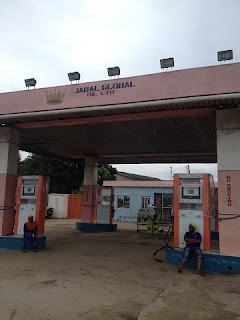 |
| The Filling Station |
During the interview, Kachikwu said; "if you do a price review after six months, you will be amazed at how low the price would have become. We expect the prices to go down because we have provided an opportunity for people to take advantage of government liberalisation policy of the downstream sector and eliminate inefficiencies and losses."
When asked about the reason for the government to have fixed the pump price of petrol in a deregulated market, he explained that "the intention of the government was to achieve what was achieved in diesel by allowing everybody to be able to bring in products and promote competition."
"However, we want to make sure that at the initial stage marketers do not take undue advantage of the situation. That's why we said nobody should sell above N145 per litre.
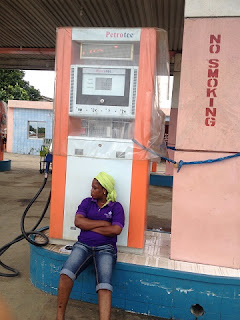 |
| An Attendant of the Station relaxing due to slow pace of sales |
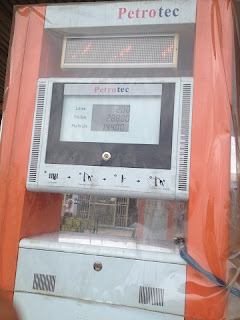 |
| The Pump meter displaying N144 per litre sale price |
"If you look at consumption of diesel, it is not as competitive as petrol. What we have done is an upper cap, but we have not told them what price to sell. We expect that efficiency and market forces will determine their pieces.
"You know we have a price band of N135 to N145 per litre, but reality is that those are guideline prices," he said.
Furthermore, he stated that other factors that may affect pricing include sources of foreign exchange, level of efficiency and how much a marketer is investing in logistics like storage and distribution.
When asked if the government has put measures in place to check marketers who may want to sell at above price cap of N145 per litre, he stated that he expects competition to bridge the gaps and eliminate abnormal profit.
Furthermore, he stated that "the difference you saw during the previous price regime of N87 per litre is just what we are trying to address because of arbitrage."
"The individuals that bought NNPC products and sell at other prices will now start buying their own products and sell on their own. Even NNPC retail stations will sell at competitive prices.
"Within six months, you will be seeing differentials of N1 to N2 per litre but as you go into interlands, NNPC will tend to be selling at between N120 to N130 per litre.
"Refineries will also become competitive. Refineries have not worked efficiently in the past because petroleum products are largely subsidized. Nobody wants to invest in refineries and at the end of the day, the government bears the brunt.
"We will sell the little a produce which is less than 10million per day and we will well at competitive prices," he said.
Subscribe to:
Posts (Atom)


